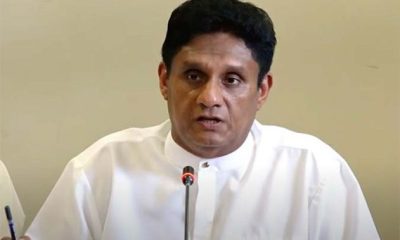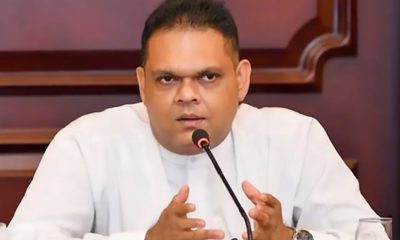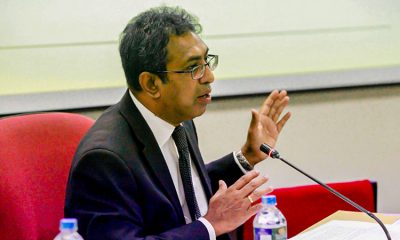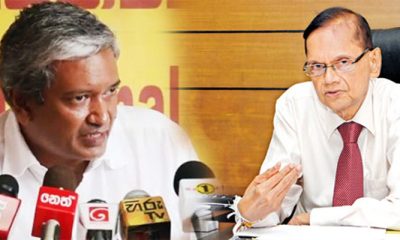News
Pathetic situation facing public revealed during clash over power sector reforms: Kanchana questions fellow SLPPer Gevindu’s suitability as MP

‘Power minister caused dispute violating consensus on amendment’
By Shamindra Ferdinando
Power and Energy Minister Kanchana Wijesekera (SLPP) has accused dissident SLPP lawmaker Gevindu Cumaratunga of hindering much needed reforms meant to improve the electricity sector.The Matara District lawmaker alleged that the National List MP simply repeated unsubstantiated claims on the basis of false information that had been provided by various interested parties hell-bent on disrupting the proposed reforms.
Minister Wijesekera regretted the inclusion of the leader of ‘Yuthukama’ civil society organisation among SLPP National List MPs. At the last general election, the SLPP secured 17 National List slots at the last parliamentary polls conducted in August 2020.
Minister Wijesekera and MP Cumaratunga recently clashed in Parliament over similar issues, including the recently gazetted Electricity Bill and the unprecedented discontinuation of electricity supply to consumers by the CEB and LECO (Lanka Electricity Company) over their failure to settle outstanding bills due to dire economic situation.
Minister Wijesekera alleged that MP Cumaratunga pursued a personal agenda at the expense of electricity sector reforms that were meant to address challenging developments in the expanding electricity sector.
During the heated exchange of words over the power sector issues, MP Cumaratunga emphasized that Minister Wijesekera acted contrary to a consensus reached between the government and the Opposition. Had Minister Kanchana as agreed included an amendment meant to ensure regulatory mechanism in respect of power generation, the ongoing dispute could have been avoided, MP Cumaratunga told The Island.
Referring to the adoption of ‘Sri Lanka Electricity Amendment Bill’ without a specific amendment on June 09, 2022 during the tail end of Gotabaya Rajapaksa’s presidency, MP Cumaratunga said that the original Electricity Act subjected power generation regardless of the size/capacity of particular project to tender process. Minister Wijesekera did away with that thereby creating an environment for corruption, MP Cumaratunga said, adding that the Opposition pressed for a regulatory mechanism.
“Following talks with concerned parties, an agreement was reached on an amendment to address our concerns,” MP Cumaratunga said. In accordance with that, the Minister agreed to free generation of up to 10 megawatts of tender procedures while generation of 10 to 100 megawatts was to be subjected to tenders, MP Cumaratunga said. The projects meant to generate 100 megawatts or more were to be subjected to parliamentary approval, MP Cumaratunga said, declaring that was the most important provision proposed by the Opposition. “Minister Wijesekera simply discarded the consensus on the agreement.”
Responding to another query, MP Cumaratunga said that in spite of the importance of the bill before the parliament, quite a number of MPs skipped the vote. Had there been any intervention by an external party to discourage MPs from voting against the bill.
Following the debate on the second reading of the bill, the Opposition called for a vote. According to MP Cumaratunga 120 votes were cast in favor and 36 were cast against. 13 Members of Parliament abstained from casting their vote. Thereby, the second reading was passed by a majority of 84 votes, he said.
Cumaratunga questioned Minister Wijesekera in parliament as to why he increased electricity tariffs having repeatedly promised that the new Amendment was meant to prevent further hikes in electricity. In addition to that the moves were afoot to privatize the CEB in the name of restructuring, MP Cumaratunga alleged, pointing out contrary to his assurances the state enterprise and the consumers were not safe today.
MP Cumaratunga urged Minister Wijesekera to review his power sector strategy anew and take tangible measures to reassure the CEB and the consumers as well.
Responding to MP Cumaratunga’s criticism of the electricity amendment bill, Wijesekera said that those who had painted an extremely negative picture of that initiative alleged that the enactment would swiftly lead to privatization of the CEB. “They expressed fears that the CEB would be abolished. Did such a thing happen following the introduction of the Amendment Bill? Scare stories and lies were propagated at the expense of the national economy.”
Minister Wijesekera challenged MP Cumaratunga to reveal just one instance the government accepted an unsolicited bid outside the laid down procedures in terms of the Electricity Amendment Act. Minister Wijesekera declared that the government hadn’t cleared a single project outside the procedures in place since the enactment of the new law. “What we really did was to rectify faults that had been caused at the time the government amended the Act in 2014. The 2022 enactment of the Electricity Amendment bill allowed the launch of projects that were held up since 2014. As a result of measures taken by the current dispensation, people were encouraged to invest in the renewable energy sector.”
Minister Wijesekera said that investors couldn’t be attracted unless the government was in a position to pay them.
MP Cumaratunga exchanged words with Deputy Speaker Ajith Rajapaksa who had been on the chair at the time the parliament took up the electricity sector reforms.
Minister Wijesekera again challenged MP Cumaratunga to reveal one unsolicited bid. MP Cumaratunga emphasized that the issue at hand was the creation of an environment to engage in corrupt practices.Minister Wijesekera assured that under no circumstances could procedures be violated as every project required the approval of the Public Utilities Commission.
News
X-Press Pearl disaster fuels global call to classify plastic pellets as hazardous
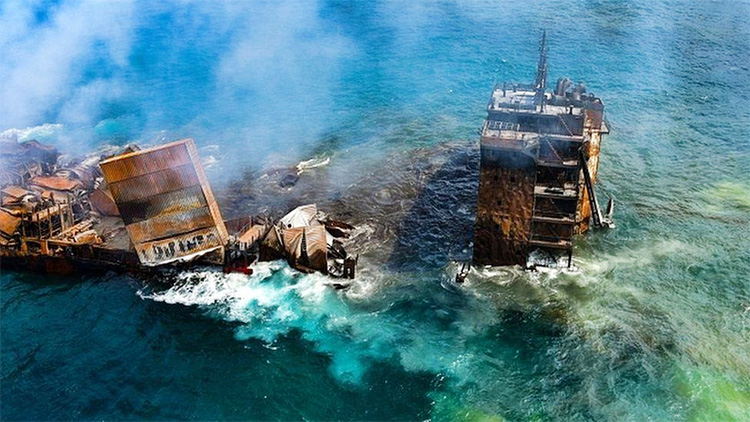
Nearly five years after the catastrophic sinking of the X-Press Pearl, off Sri Lanka’s western coast, the environmental scars remain visible — from contaminated beaches to disrupted fisheries. Now, that tragedy has become a rallying point for an international coalition of scientists, demanding urgent reforms to global maritime law.
A group of leading researchers and environmental experts is calling on the International Maritime Organisation (IMO) to formally recognise plastic pellets — commonly known as nurdles — as hazardous to the marine environment. They argue that existing international shipping regulations fail to adequately address the environmental devastation caused by pellet spills.
Their appeal comes through a newly accepted scientific commentary, published in Cambridge Prisms: Plastics, consolidating decades of research on the impacts of plastic pellet pollution.
Plastic pellets are small, lentil-sized (2–5 mm) particles made from virgin or recycled plastic and used to manufacture a vast range of plastic
products. Scientists say that spills occur frequently during handling and transport, both on land and at sea. Once released into the ocean, pellets persist for decades, spreading across vast distances and entering marine food chains.
Dr. Jennifer Lavers, who studies pollutants in seabirds, warned that the scale of plastic ingestion has reached crisis levels.
“Today the volumes of plastic pellets entering the marine environment are enough to ‘feed’ millions of young seabirds,” she said. “In some areas we are seeing nearly a 100% rate of plastic ingestion, with pellets being particularly problematic.”
Beyond physical harm such as digestive blockages in wildlife, pellets also pose chemical threats. According to Dr. Sinja Rist of DTU Aqua, they are far from inert materials.
“Pellets are persistent, widely dispersed, readily ingested by wildlife, and capable of transporting hazardous chemicals,” she explained, noting that they can absorb and release toxic substances across oceans.
Sri Lanka’s experience with the X-Press Pearl disaster, in 2021, highlighted these dangers on an unprecedented scale. The burning container ship released vast quantities of chemicals and billions of plastic pellets into the sea, causing widespread marine contamination and severe economic losses to coastal communities.
Hemantha Withanage, Chairperson of the Centre for Environmental Justice in Sri Lanka, said the disaster exposed major gaps in international maritime regulation.
“After studying the aftermath of the X-Press Pearl disaster, it is impossible to argue that plastic pellets are harmless cargo,” Withanage stressed. “The impacts in Sri Lanka were immediate, widespread, and long-lasting. Stronger international regulation is essential to prevent this from happening again.”
Under the International Convention for the Prevention of Pollution from Ships (MARPOL), the intentional discharge of plastics is banned. However, scientists argue that current rules are inadequate when it comes to preventing or responding to accidental spills, especially those involving container ships.
The researchers are urging the IMO to assign plastic pellets a specific United Nations classification number. Such recognition would formally acknowledge their environmental hazard potential and trigger stricter requirements for packaging, labelling, and emergency notification during shipping.
Dr. Therese Karlsson, lead author of the commentary and Science Advisor for the IPEN, said the scientific case is clear.
“There are decades of studies highlighting threats from plastic pellets released into the oceans, including risks to marine animals and the food chain,” she said. “Plastics contain thousands of chemicals, many known to cause harm to the environment and human health. It is past time for global regulations to protect our oceans.”
The European Union has recently introduced measures aimed at preventing pellet losses throughout the supply chain, and in 2021 the IMO committed to addressing pellet pollution as part of broader efforts to reduce marine plastic litter. Yet experts warn that without binding global action, pellet spills will continue.
For Sri Lanka, still recovering from one of the worst maritime environmental disasters in its history, the international call carries particular urgency.
Scientists say the message from the island nation’s experience is unmistakable: plastic pellets must no longer be treated as ordinary cargo, but as hazardous materials demanding strict global oversight.
By Ifham Nizam
News
Foreign Minister Herath decries deadlock in global disarmament
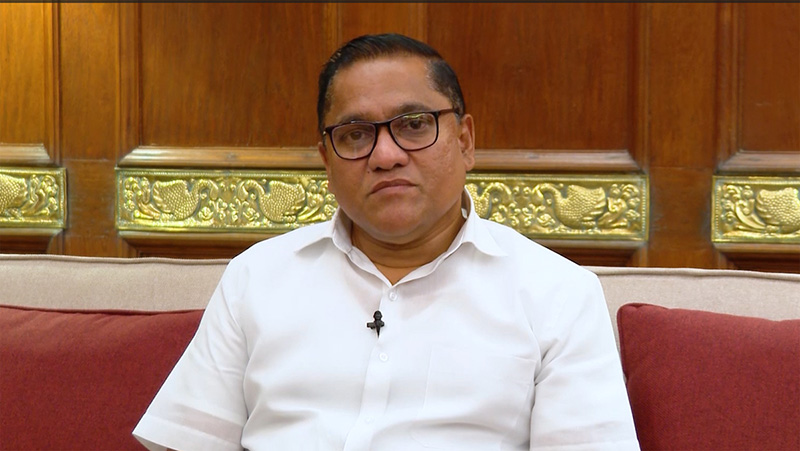
Minister of Foreign Affairs, Vijitha Herath, has underscored the urgent global need for enduring peace, security, and strengthened multilateral cooperation, warning that rising geopolitical tensions have created deadlocks in global disarmament efforts and posed serious challenges to international humanitarian law.
The Minister said so while addressing the High-Level Segment of the Conference on Disarmament (CD) in Geneva on Monday (23 Feb), reaffirming Sri Lanka’s firm commitment to global disarmament and multilateral cooperation.
Minister Herath said that safeguarding the future of humanity must be treated as a paramount priority, stressing that trust and mutual respect are essential foundations for effective decision-making in multilateral forums. He reaffirmed that Sri Lanka remains committed to ensuring a secure and stable world for future generations.
Highlighting Sri Lanka’s longstanding role in nuclear disarmament, he recalled the country’s contribution to the 1964 Non-Aligned Movement Summit in Cairo, which called for the establishment of nuclear-free zones. He reiterated that Sri Lanka continues to strongly support such initiatives, particularly in the Middle East, and emphasiSed that total elimination and non-proliferation remain the only guarantees against the use of nuclear weapons.
Sri Lanka also urged that non-nuclear-weapon states must receive unconditional, non-discriminatory, legally binding security assurances, achievable through the work of the Conference on Disarmament.
On humanitarian demining, Minister Herath noted that Sri Lanka remains an active partner in that effort and currently serves as a senior member of the victim assistance committee of the Anti-Personnel Mine Ban Convention. He further reaffirmed Sri Lanka’s continued commitment to the Cluster Munitions Convention, which the country presided over in 2019.
Recognising the rapidly evolving threat landscape, the Minister warned of the impact of emerging technologies that have already reshaped the global disarmament architecture while putting international humanitarian law at significant risk. In this context, he said Sri Lanka has been advocating for the early start of negotiations on a legally binding instrument to prohibit lethal autonomous weapon systems.
He also addressed growing threats to outer space security, stressing that Sri Lanka, long a supporter of disarmament in outer space, continues to back negotiations on a legally binding instrument to prevent an arms race beyond Earth.
Minister Herath concluded by affirming Sri Lanka’s readiness to work with all nations to ensure global efforts toward a safer world are accelerated and achieved at the earliest opportunity.
News
CoPF orders officials to establish legal framework for Rs. 200 for estate workers daily attendance allowance
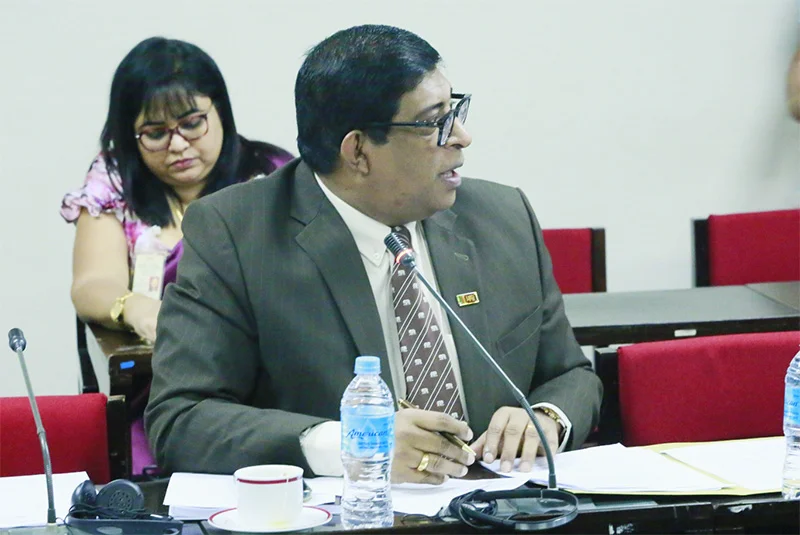
The Parliamentary Committee on Public Finance has directed officials to establish a proper legal framework for the Rs. 200 daily attendance allowance provided by the Government to estate workers.
During the Committee meeting on February 17, 2026, chaired by MP Dr. Harsha de Silva, members emphasised that while there is no objection to increasing estate worker wages, the current payment mechanism lacks a formal legal basis. The allowance is being distributed under a Memorandum of Understanding (MoU) with private plantation companies without gazette notification, leaving the arrangement vulnerable to termination and excluding contributions to the Employees’ Provident Fund (EPF) and Employees’ Trust Fund (ETF), according to parliament sources.
Officials noted that the MoU with plantation companies was valid for three years, and thereafter a policy decision would be required to continue the payments. The Committee stressed that public funds should not be used to pay salaries in private institutions without proper financial discipline, despite the allowance being approved under the 2026 Budget as a “development subsidy.” The Deputy Secretary to the Treasury suggested the payment would be more appropriately classified as a “production incentive,” though existing payments and MoUs did not specify such requirements.
The Committee also reviewed disaster relief efforts for those affected by Cyclone Ditwah. Officials reported that approximately Rs. 24.4 billion had been disbursed under various relief programs, including allowances for house cleaning, household purchases, and school assistance. Delays in housing reconstruction and rental support were attributed to damage assessments and land identification, with Committee members urging faster delivery of housing aid.
Officials from the National Insurance Trust Fund (NITF) highlighted reinsurance claims of around Rs. 11 billion following Cyclone Ditwah, noting that although NITF had not reinsured its exposure internationally since 2023, it was capable of settling existing claims.
-

 Features3 days ago
Features3 days agoWhy does the state threaten Its people with yet another anti-terror law?
-

 Features3 days ago
Features3 days agoReconciliation, Mood of the Nation and the NPP Government
-

 Features3 days ago
Features3 days agoVictor Melder turns 90: Railwayman and bibliophile extraordinary
-

 Features2 days ago
Features2 days agoLOVEABLE BUT LETHAL: When four-legged stars remind us of a silent killer
-

 Features3 days ago
Features3 days agoVictor, the Friend of the Foreign Press
-

 Latest News5 days ago
Latest News5 days agoNew Zealand meet familiar opponents Pakistan at spin-friendly Premadasa
-

 Latest News5 days ago
Latest News5 days agoTariffs ruling is major blow to Trump’s second-term agenda
-

 Latest News5 days ago
Latest News5 days agoECB push back at Pakistan ‘shadow-ban’ reports ahead of Hundred auction


